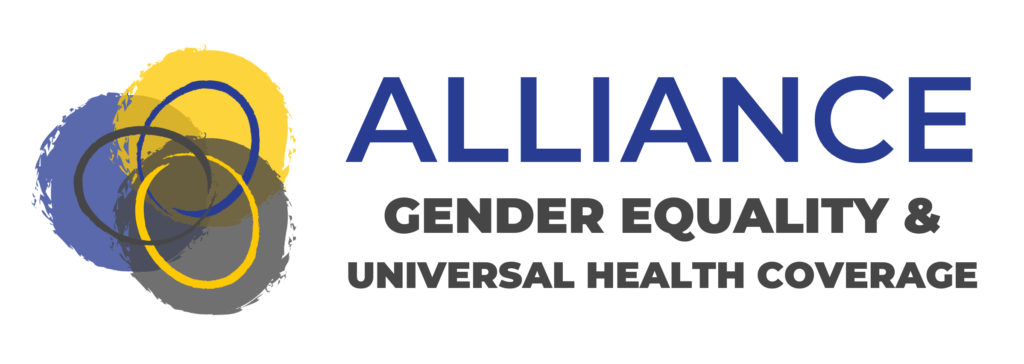In the 2023 Political Declaration on Universal Health Coverage (UHC), governments missed the opportunity to truly advance gender-responsive UHC, particularly regarding the sexual and reproductive health and rights (SRHR) of women, girls, gender-diverse and marginalized groups.
The Alliance for Gender Equality and UHC has consistently called on governments to prioritize gender-responsive UHC and uphold the commitments made in 2019. This year, we emphasized the need for progress in gender equality, women and girls’ human rights, SRHR, and support for women health workers. Regrettably, only a few of the key targets we identified were addressed in the declaration. This slow progress impedes girls, women, gender-diverse and marginalized groups from fulfilling their right to the highest attainable standard of health, and it means they may continue to be left behind as governments now focus on implementation of the commitments in the declaration.
Despite many challenges, we have witnessed key advancements. The 2023 UHC Political Declaration incorporated language and commitments that will help to address gender inequalities and support gender-responsive UHC, in particular those related to the health workforce, women’s leadership, gender-based violence (GBV), and menstrual health. We are pleased to see that the Political Declaration:
However, progress has fallen short of our expectations, particularly in crucial areas like human rights, discrimination, funding, and support for adolescent girls. Specifically, regarding sexual and reproductive health rights (SRHR), the Declaration merely reiterates existing language from 2019, lacking substantive advancements. This stagnation is concerning, especially given the disruptions to essential services during the COVID-19 pandemic and the regressive backlash on the rights of women and girls that is impacting global policies. Dr. Roopa Dhatt, ED of Women In Global Health, emphasizes, ‘We cannot attain UHC for women and girls unless their most basic rights are recognized and fulfilled.’
Initially, the declaration included text addressing inadequate access to SRH services for all, which was removed in the final version, along with language on unilateral coercive measures, both areas where consensus couldn’t be reached. This rollback affects girls and women, jeopardizing their bodily autonomy in global policymaking.
Elise Umutoniwase, a Youth programs officer at Tanga Community in Rwanda, voices her concern: ‘The continued exclusion of young people’s SRHR, their bodily autonomy, and agency in UHC is concerning and blind to the lived realities that young women, girls, and gender-diverse people continue to face, especially in Africa.’
Furthermore, the Declaration lacks gender-responsive budgeting for UHC and fails to address urgent reforms in international financial structures, exacerbating economic inequalities and imposing barriers to women and girls’ health in low and middle-income countries (LMICs). These inequalities, including debt crises, tax injustices, and unfair trade policies, hinder UHC and create obstacles for women and girls’ health and well-being.
The promotion, protection, and fulfillment of women’s and girls’ human rights are essential for advancing UHC. It cannot be achieved without recognizing the significance of SRHR and gender equality. The slow progress in securing commitments to gender equality is disheartening, particularly in documents guiding national health policies and services aimed at reaching those furthest behind.
SRH services are a fundamental aspect of the right to health, yet SRHR is under threat globally. These services, including access to menstrual and sanitary health products, are critical for ensuring the right to quality education, particularly for young girls. Governments and all stakeholders must ensure non-discriminatory access to comprehensive SRH information and services across the lifecourse, including their inclusion in benefits packages, and adequate funding, costing, and budgeting.
Nkechika Ibe, Founder and Director of Impact Her World Foundation, Nigeria, adds, “Sexual and reproductive health rights are human rights too and must be given utmost commitment by all stakeholders for progress to be achieved.”
The 2023 Political Declaration on UHC has presented an opportunity for progress, but the lackluster outcomes are deeply concerning. It is imperative that we turn this opportunity into real, meaningful action. The rights and well-being of women and girls are at stake, and we must not allow this critical moment to pass us by. Decision-makers must prioritize gender equality and SRHR in the pursuit of universal health coverage to safeguard and enhance the rights and well-being of women and girls, truly leaving no one behind.
Eleanor Blomstrom, Senior Manager of Policy and Advocacy at Women Deliver, urges, ‘We are now looking to Member States to implement UHC and ensure gender-responsive health services—in particular SRHR interventions—to reach all people with the health services they need, without financial hardship.’
